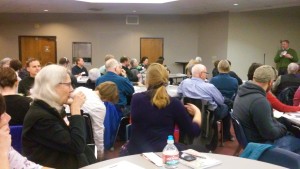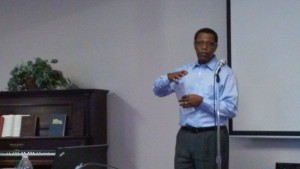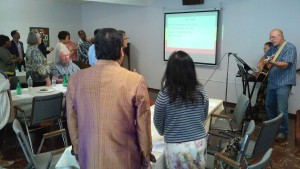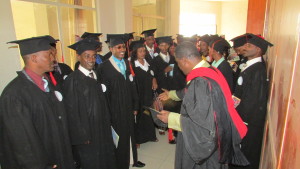Read what has come before here.
You can’t take this journey vicariously. It won’t happen by reading a book or watching a documentary. Doesn’t happen by listening to a sermon. A church won’t become inclusive by saying, “Anyone is welcome here.” Because what that means is they can come as long as they are willing to do things our way. But ask us to adapt what we do to accommodate them, no way! Ask us to change? Hey, this is our church.
Do you want to know what it f
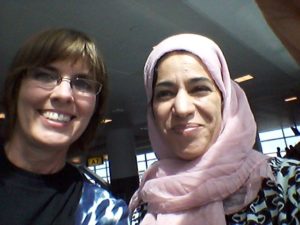
eels like for someone from another culture, another country, another religion to come into your church? The same way you (a committed Christian) would feel by going to worship at a Buddhist temple. The same way you would feel when entering a mosque on Friday afternoon. Don’t be so ethnocentric as to think they would like it in your church.
Friend, the onus is on us, to invite them into our homes, and to go to theirs; to take difficult steps in a risky direction.
Which leads to the third part of the adventure. Peter must have cringed when he heard where Cornelius lived: the town of Caesarea; hear it? “Caesar—ea” This was Rome central. Regiments of Italians probably marched nearby as Peter rode into town. Herod himself had a retreat here. The smell of pasta and fettuccine filled the air. The aroma of grilled pork, a stench to Jews, wafted across the streets.
Cornelius had called together all his relatives. As Peter approached, the Centurion ran to greet him, kneeling in respect. Peter entered the home and said, “You know how unlawful it is for a Jewish man to keep company with or go to one of another nation. But God has shown me that I should not call any man common or unclean.” (Acts 10:28)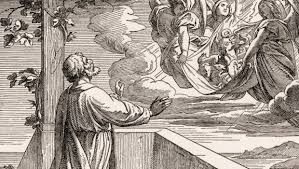
Cornelius describes the visitation of the angel, with instructions to call for Peter. They are ready to listen. And Peter lifts up the hood to unveil the theological engine of the mission of God. “In truth I perceive that God shows no partiality. But in every nation whoever fears Him and works righteousness is accepted by Him.” (Acts 10:34-35)
Peter shares the message of the death, burial and resurrection of Jesus Christ for the forgiveness of sins and granting of eternal life. The stamp of approval on this colossal new development comes with a thud — the Holy Spirit falls on them all. Peter concludes this is the same Spirit that had come upon the Jews not many months earlier, and baptizes them all in water.
What is the lesson here? To align the calling of our church with God’s mission, we must break the rules that protect our comfortable enclave. AND, we must be willing to be criticized by the powerful people who haven’t seen the vision.
That brings up back to where we began: on Pause.
The early church is scattering and on the move, but at a standstill in the mission of God—Jews speaking only to Jews. Word arrives that Peter, our senior pastor!, has gone to the home of a Roman centurion! And the Holy Spirit has been given to the Gentiles. The remaining elders in Jerusalem, when they hear this, drew silent, and glorified God, saying, “Then God has also granted to the Gentiles repentance to life.” (Acts 11:18).
So a few folks from Cyprus—islanders, that’s what you’d expect from them– and a few brothers from Cyrene – Africans, that explains it—they came into Greeksville and spoke to the Hellenists, preaching the Lord Jesus.
And the church got off Pause…
and Played.
You know what is fascinating? God has brought Romans and Hellenists right into your town! Many of them have never heard an explanation of who Jesus is. Many have never gotten to know a Jesus-follower. Many international students, many foreign-born engineers, medical practitioners, have never been invited into the home of an American. They’re cautious… but curious. And many of them have been called by God into His forever family.
Who will invite them home for a cup of tea?
Who will explain an English word, or show how a chocolate chip cookie is made?
Who will ask them how they are doing?
Who will take them to a ball game or a bowling alley, or a museum?
Who will offer to take them to their appointment or pick them up at the airport?
Those who see a new vision.
Those who take difficult steps in a risky direction
And those who break the rules that protect a comfortable enclave.
Those who push play, no matter the cost.
photocredit: myocn.net
Save
Save





